Wix and Weebly are two of the most well-known website builders, along with Squarespace. I’ve written individual reviews on both platforms, but the question is, how do they stack up against each other?
In this head-to-head comparison, I cover everything you need to know, including pricing, onboarding, design and technical features, customer support, and more.
What Is a Website Builder?
First, a bit of background. All-in-one website builders like Wix and Weebly have made it easier than ever to create and maintain a website. You no longer require coding skills or web design experience – they provide everything you need to get started and grow your website.
This contrasts solutions where you buy, install, and manage all the “pieces” of your website separately. That’s not a good or bad thing. But it is something to be aware of when you’re choosing one of them as a solution…since it affects your website both long and short term.
In the long term, it affects your versatility, functionality, and, possibly, brand. In the short term, it can remove a lot of headaches. But just like buying a house or office, there is no such thing as an absolute “best” or “top” choice. There’s only the right choice relative to your goals, experience, and circumstances.
Weebly and Wix compete with options like WordPress (which provides the free software to build a website that you own & control – see my WordPress setup guide here) to typing actual HTML code into a text file. With all of this in mind, let’s get to the comparison.
Pricing
Generally speaking, Weebly bases its plan pricing on technical and eCommerce features, whereas Wix plans are based on a wide range of factors. Both Wix and Weebly offer a free plan, though you can’t use a custom domain, and it displays Weebly / Wix ads.
Wix Plans
Wix has very customizable pricing tiers – with some limits on every tier, even up to VIP.
| Plan | Combo | Unlimited | Pro | VIP |
|---|---|---|---|---|
| Price | $14.00/mo. | $18.00/mo. | $23.00/mo. | $39.00/mo. |
| Storage | 3 GB | 10 GB | 20 GB | 35 GB |
| Bandwidth/month | 2 GB | unmetered | unmetered | unmetered |
| Email Accounts | - | - | - | - |
| Dedicated Domain | ||||
| Free Domain Name | 1 year | 1 year | 1 year | 1 year |
| Free SSL | ||||
| Display Ads | ||||
| Analytics |
Weebly Plans
| Plan | Personal | Professional | Performance |
|---|---|---|---|
| Price | $9.00/mo. | $16.00/mo. | $29.00/mo. |
| Yearly Price (discount) | $7.00/mo. | $15.00/mo. | $30.00/mo. |
| Storage | unlimited | unlimited | unlimited |
| Visitors/month | unmetered | unmetered | unmetered |
| Email Accounts | - | - | - |
| Dedicated Domain | |||
| Free Domain Name | - | 1 year | 1 year |
| Free SSL | |||
| Display Ads | |||
| Analytics |
Weebly has an excellent Personal plan. The Professional plan adds HD audio & video & forum functionality. The Performance Plan folds in a lot more eCommerce functionality for an online store.
The short version is that Weebly offers the most features for the price and the fewest real caps at each tier. Weebly’s starter tier is a particularly attractive tier for most small businesses and personal sites.
Wix’s pricing is very different due to its tier structure & bonuses. They are competitive – but be sure to note your exact needs and features.
Weebly generally does better on pricing upfront value for most starter sites. However, the most important thing here is for you to write down your needs & goals – evaluate each tier based on that – rather than looking at features that you may never use.
*Reminder – these costs are all very different than if you are looking at building your own site with WordPress or something else. Part of the point of a site builder is the bundled pricing, where hosting and software costs are added together – and are priced per site. It’s possible to get many custom websites with unlimited functionality for much cheaper if you build them yourself using separate hosting & software.
Winner: Weebly
Onboarding & User Experience
A huge selling point of website builders is that they have a near-zero learning curve. They have a straightforward process from website concept to website reality.
On this point, Weebly wins, in my experience, but Wix is solid. I like how Weebly has a way for you to immediately segment yourself by website type. They also offer unintrusive info buttons, pop-ups, a checklist, and an email sequence to keep you on track.
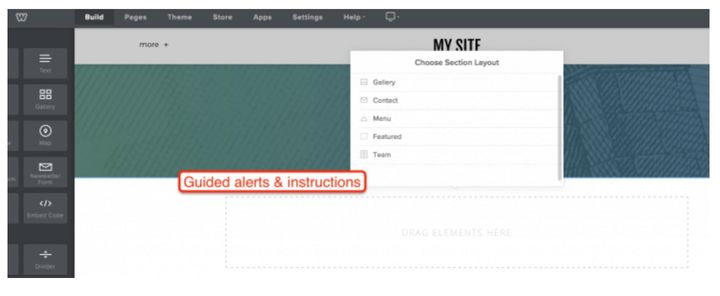
Wix is fine for onboarding. They have an email sequence, which is mainly focused on hard selling their premium plans over helping. Their backend is straightforward but requires clicking and strategizing to decide what to do next. They have a *ton* of features directly in the Wix editor. Once you locate everything, it’s great. But at first, it can be overwhelming.
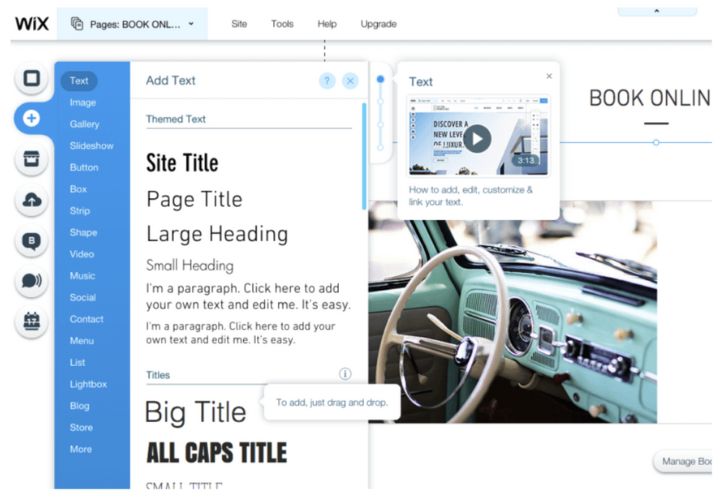
Wix also has excellent “templating” and a “design AI” tool that handles a lot of the design work for you. Whether that works in practice or not all depends on your goals. I explored this tradeoff in-depth in my Wix Review. If you are a DIYer who doesn’t want to work with code at all – then it’s amazing. If you want to manage the details yourself, then it’s not ideal.
Weebly layers its builder features in a way that makes sense to me. But if you like having all the options and functionality fully visible, you’ll feel comfortable with Wix. Weebly wins on user experience and onboarding, but it’s close.
Winner: Weebly
Design Features
Achieving a great website design is hard, but it matters a lot. Many people can spot a good-looking website but do not know how to get there. Using a template as a foundation and then customizing it with a website editor is a good way to get the site you want without paying for a custom design or website development.
Weebly has a diverse range of templates. Their collection is solid, but even as a non-designer, I can tell that a Weebly theme is more functional than anything. The Weebly editor has reliable customization options and a drag-and-drop design. And, if you want to dig under the hood, you can always edit the HTML/CSS directly.
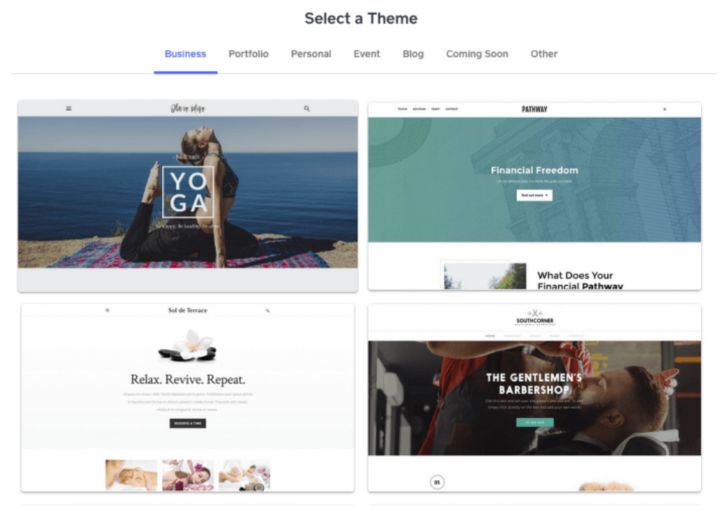
Wix’s designs are solid and modern looking. The Wix template collection has improved a lot over the last few years. Whether you want a moving image or a parallax feel – Wix has plenty of pre-built “fancy” templates to choose from. However, Wix doesn’t allow any CSS customization on a Wix theme. They also don’t allow you to switch back and forth between templates, so you’re really stuck with whatever templates they have – and whichever one you commit to.
I did dig up a bunch of actual Wix website examples out in the wilds of the Internet. The one truly unique design feature they have is the Wix ADI tool (artificial design intelligence). It’s an app built into Wix’s editor that creates a completely unique design based on your input.
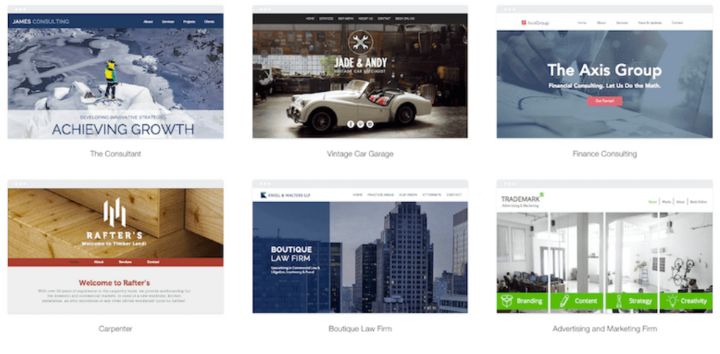
If you want solid, functional, nice designs – you’ll probably like Weebly. If you want more trendy designs, then you’ll like Wix.
Technical Features
The technical features of a website allow you to generate clean URLs, edit metadata, enable page-level redirects, etc.
Weebly is very sound when it comes to technical features. They have things they could do better (i.e., a blogging platform and content management system – and they fall short of good self-hosted websites.
What Weebly does have is plenty of front-end tools. They can automatically generate permalinks and their HTML is well-coded.
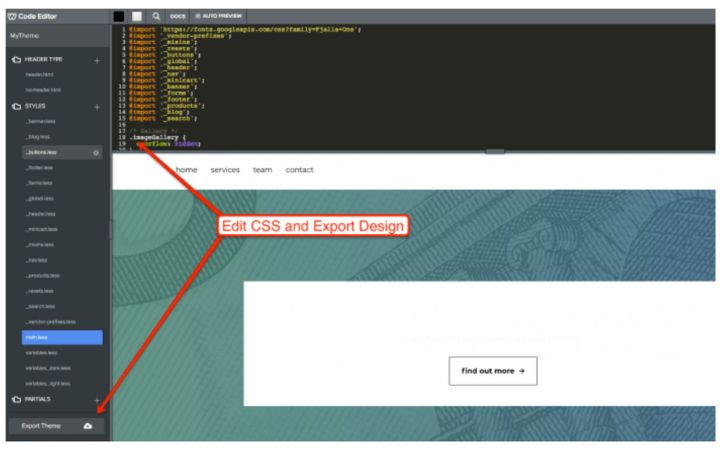
The laggard is Wix. They build and serve their pages in a way that is not ideal from a professional developer’s perspective. The system is much better than their old Flash technology but is still clunky to look at from a technical perspective.
Wix websites get a URL structure that works but is not ideal. It runs more like a game application than a website. And this isn’t just my opinion – browse any thread on HackerNews about Wix, and you’ll get the same feedback.
I covered this in my Wix Review. It’s a non-issue if you are DIY – but it is something to be aware of if you are looking to hire SEO help, for example.
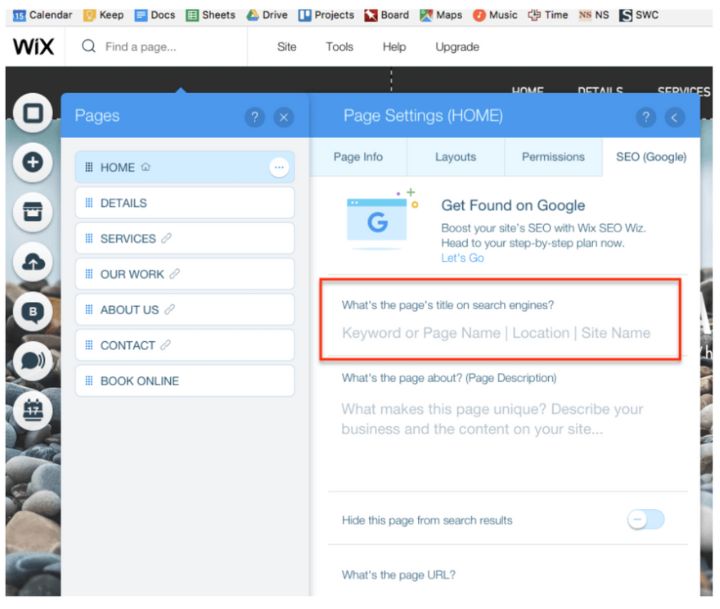
Winner: Weebly
Marketing Features
Marketing features like custom metadata, open graph information, Schema markups, email signups, share buttons, landing pages, social media integration, SEO tool, etc, all make marketing your site a lot easier.
For overall marketing features, Weebly and Wix do well.
Weebly allows you to place custom Javascript anywhere, opening many opportunities from custom tools (like OptinMonster) to retargeting and conversion rate codes.
Wix is rapidly improving compared to their old setup. They provide many more native apps compared to Weebly. So if you are willing to commit fully to the Wix “ecosystem,” you’ll have plenty of choices. Many of Wix’s best marketing tools are in the Wix app market. If you want to add additional features using a 3rd party plugin, app, script, or template, then Weebly has a better setup.
This also pertains to Search Engine Optimization (SEO) – which is my wheelhouse. Both allow you to execute fundamentals like keyword usage, crawlability, etc. However, if my client had a heavy emphasis on organic traffic, I would encourage Weebly based primarily on versatility – not on the idea that one is “better for SEO” than another. That said, this one is too close to call.
Support & Service
Wix and Weebly have in-depth knowledge bases and solid customer support. You can contact both companies in addition to email tickets and customer forums.
Wix’s Customer Care department offers telephone callback support in 11 languages, including 24/7 English language support.
Weebly’s telephone support is only available during standard business hours.
Support & service are similar, but Wix gets the nod for offering extended hours of telephone support.
Winner: Wix
Company Structure & Future
I’ve been immersed in the website building and technology industry for more than two decades now. I can tell you that the most underrated factor in choosing a vendor for your own business is the structure & incentives of the actual company.
In short, you need a company whose structure matches your own business goals. Yes – that sounds vague and conceptual. But here’s how it applies to Weebly and Wix.
Weebly was a private company until they were acquired by Square (now Block, Inc.) As a subsidiary of a publicly-traded company, Weebly is part of a larger group of products. This means that users will get access to lots of unique features & partnerships. You can expect good plan prices and customer support.
The downside is that Weebly is only valuable if it drives growth to other Square products (i.e., eCommerce platform payments). If it doesn’t, then Weebly could slowly die of benign neglect.
Wix is a publicly-traded company. You can actually buy a share and become a part-owner if you want. As such, Wix will continue to pursue growth and profitability like every other public company. Anything that drives that profitability will garner resources.
The upside is that Wix actually makes its money with its website builder. That’s their main thing. So their product gets total focus. The downside is that they are a publicly-traded company governed by Net Promoter Scores and Earnings Estimates – and all the good & bad that that could entail.
Wix vs. Weebly Conclusion
Overall Winner: Weebly
Weebly is my overall winner based on the areas that I have covered in this comparison.
In my opinion, Weebly strikes a better balance when it comes to pricing, functionality, and onboarding, though they lack cutting-edge design templates. Get a free trial for Weebly here.
However, if you’ve decided that using an all-inclusive website builder is right for you, I would get out of the mindset of finding “the best” – and instead, think through what you need now – and what you hope to do in the future.
Wix focuses on 100% DIYers who are willing to relinquish some control over the technical features in exchange for ease of use and added convenience. You do get useful native tools & good templates for a business website. Get a free trial for Wix here.
If you’re interested in taking a quiz to help sort your goals/preferences – take my website builder quiz here.



